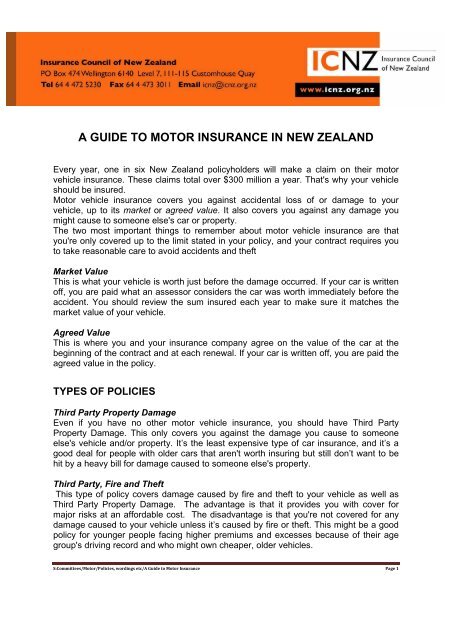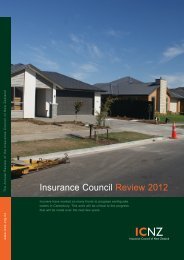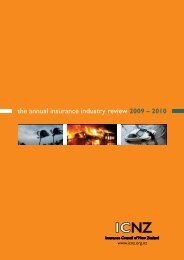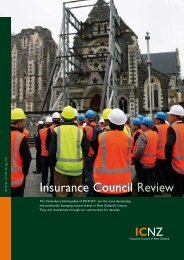a guide to motor insurance in new zealand - Insurance Council of ...
a guide to motor insurance in new zealand - Insurance Council of ...
a guide to motor insurance in new zealand - Insurance Council of ...
You also want an ePaper? Increase the reach of your titles
YUMPU automatically turns print PDFs into web optimized ePapers that Google loves.
A GUIDE TO MOTOR INSURANCE IN NEW ZEALAND<br />
Every year, one <strong>in</strong> six New Zealand policyholders will make a claim on their mo<strong>to</strong>r<br />
vehicle <strong><strong>in</strong>surance</strong>. These claims <strong>to</strong>tal over $300 million a year. That's why your vehicle<br />
should be <strong>in</strong>sured.<br />
Mo<strong>to</strong>r vehicle <strong><strong>in</strong>surance</strong> covers you aga<strong>in</strong>st accidental loss <strong>of</strong> or damage <strong>to</strong> your<br />
vehicle, up <strong>to</strong> its market or agreed value. It also covers you aga<strong>in</strong>st any damage you<br />
might cause <strong>to</strong> someone else's car or property.<br />
The two most important th<strong>in</strong>gs <strong>to</strong> remember about mo<strong>to</strong>r vehicle <strong><strong>in</strong>surance</strong> are that<br />
you're only covered up <strong>to</strong> the limit stated <strong>in</strong> your policy, and your contract requires you<br />
<strong>to</strong> take reasonable care <strong>to</strong> avoid accidents and theft<br />
Market Value<br />
This is what your vehicle is worth just before the damage occurred. If your car is written<br />
<strong>of</strong>f, you are paid what an assessor considers the car was worth immediately before the<br />
accident. You should review the sum <strong>in</strong>sured each year <strong>to</strong> make sure it matches the<br />
market value <strong>of</strong> your vehicle.<br />
Agreed Value<br />
This is where you and your <strong><strong>in</strong>surance</strong> company agree on the value <strong>of</strong> the car at the<br />
beg<strong>in</strong>n<strong>in</strong>g <strong>of</strong> the contract and at each re<strong>new</strong>al. If your car is written <strong>of</strong>f, you are paid the<br />
agreed value <strong>in</strong> the policy.<br />
TYPES OF POLICIES<br />
Third Party Property Damage<br />
Even if you have no other mo<strong>to</strong>r vehicle <strong><strong>in</strong>surance</strong>, you should have Third Party<br />
Property Damage. This only covers you aga<strong>in</strong>st the damage you cause <strong>to</strong> someone<br />
else's vehicle and/or property. It’s the least expensive type <strong>of</strong> car <strong><strong>in</strong>surance</strong>, and it’s a<br />
good deal for people with older cars that aren't worth <strong>in</strong>sur<strong>in</strong>g but still don’t want <strong>to</strong> be<br />
hit by a heavy bill for damage caused <strong>to</strong> someone else's property.<br />
Third Party, Fire and Theft<br />
This type <strong>of</strong> policy covers damage caused by fire and theft <strong>to</strong> your vehicle as well as<br />
Third Party Property Damage. The advantage is that it provides you with cover for<br />
major risks at an affordable cost. The disadvantage is that you're not covered for any<br />
damage caused <strong>to</strong> your vehicle unless it’s caused by fire or theft. This might be a good<br />
policy for younger people fac<strong>in</strong>g higher premiums and excesses because <strong>of</strong> their age<br />
group's driv<strong>in</strong>g record and who might own cheaper, older vehicles.<br />
S:Committees/Mo<strong>to</strong>r/Policies, word<strong>in</strong>gs etc/A Guide <strong>to</strong> Mo<strong>to</strong>r <strong>Insurance</strong> Page 1
Comprehensive<br />
The comprehensive policy covers you aga<strong>in</strong>st accidental loss <strong>of</strong> or damage <strong>to</strong> your<br />
vehicle, as well as any damage <strong>to</strong> other people’s vehicles or property, whether it was<br />
your fault or someone else’s. It also covers other costs like salvag<strong>in</strong>g your car from the<br />
accident scene and <strong>to</strong>w<strong>in</strong>g it <strong>to</strong> a repairer.<br />
As well as the standard policy, companies <strong>of</strong>fer a wide variety <strong>of</strong> options and benefits.<br />
To get the best from your <strong><strong>in</strong>surance</strong>, decide what cover you are most likely <strong>to</strong> need.<br />
Generally, the more extensive the cover, the more expensive the policy.<br />
Do you want the <strong>in</strong>surer <strong>to</strong> provide:<br />
• costs <strong>of</strong> alternative transport such as a rental car?<br />
• au<strong>to</strong>matic cover when you change vehicles?<br />
• cover for trailers?<br />
a replacement vehicle if yours was less than one year old?<br />
• no excess for w<strong>in</strong>dscreen claims?<br />
Your answers <strong>to</strong> these and any other questions will determ<strong>in</strong>e which company you<br />
<strong>in</strong>sure with and at what price.<br />
Disclosure <strong>of</strong> relevant <strong>in</strong>formation<br />
<strong>Insurance</strong> is a contract between you and your <strong>in</strong>surer act<strong>in</strong>g <strong>in</strong> utmost good faith. You<br />
need <strong>to</strong> provide complete and accurate ‘material <strong>in</strong>formation’ (<strong>in</strong>formation that is<br />
important or relevant) when tak<strong>in</strong>g out or re<strong>new</strong><strong>in</strong>g a policy, or mak<strong>in</strong>g a claim. This may<br />
<strong>in</strong>clude <strong>in</strong>formation that was not asked for directly <strong>in</strong> the policy form.<br />
A material fact is one that may <strong>in</strong>fluence a prudent <strong>in</strong>surer <strong>in</strong> decid<strong>in</strong>g whether<br />
or not <strong>to</strong> <strong>in</strong>sure you, and if so, at what terms and conditions and for what<br />
premium.<br />
An example <strong>of</strong> a material fact would be a previous driv<strong>in</strong>g conviction. If you’re not sure<br />
which facts are considered material, discuss this with your <strong>in</strong>surer. Remember, if you<br />
don’t disclose all material <strong>in</strong>formation, your <strong>in</strong>surer may refuse <strong>to</strong> pay your claim or even<br />
cancel your <strong><strong>in</strong>surance</strong> from the start<strong>in</strong>g date <strong>of</strong> the policy.<br />
PREMIUMS<br />
A premium is the amount you pay each year <strong>to</strong> have your vehicle covered by <strong><strong>in</strong>surance</strong>.<br />
Premiums are traditionally paid annually, but other options can <strong>in</strong>clude monthly,<br />
quarterly or half-yearly payments. These can be au<strong>to</strong>matically deducted from your bank<br />
account. Instalments generally cost more, because it costs the company more <strong>to</strong> handle<br />
<strong>in</strong>stalments than it does <strong>to</strong> process one annual payment.<br />
S:Committees/Mo<strong>to</strong>r/Policies, word<strong>in</strong>gs etc/A Guide <strong>to</strong> Mo<strong>to</strong>r <strong>Insurance</strong> Page 2
Premium rates can be based on:<br />
• the age and sex <strong>of</strong> the ma<strong>in</strong> driver and their accident record<br />
• who else may be driv<strong>in</strong>g the vehicle<br />
• where the vehicle is used or kept<br />
• what the vehicle is used for<br />
• the vehicle's value<br />
• previous claims record<br />
Your premium and excess may be higher if the vehicle:<br />
• is parked overnight on the street so is more likely <strong>to</strong> be s<strong>to</strong>len<br />
• is a commercial vehicle, so is driven more and is more likely <strong>to</strong> be <strong>in</strong>volved <strong>in</strong> an<br />
accident<br />
• has a young or <strong>in</strong>experienced driver<br />
• has a driver with previous traffic convictions<br />
• is an exotic import with expensive and hard-<strong>to</strong>-get parts<br />
Government levies<br />
All policies <strong>in</strong>clude a separate charge <strong>to</strong> fund the Fire Service. The Earthquake<br />
Commission no longer provides cover for vehicles. Cover for earthquake is now<br />
available from <strong><strong>in</strong>surance</strong> companies.<br />
Excess<br />
An excess is the amount you pay for each claim you make. For example, you might pay<br />
the first $250 and the company pays everyth<strong>in</strong>g above that, up <strong>to</strong> the policy limit.<br />
Excesses help keep the cost <strong>of</strong> premiums down because <strong>in</strong>surers don't have <strong>to</strong> pay for<br />
numerous small claims.<br />
Standard excesses may range from $250 <strong>to</strong> $500, but there are other excesses which<br />
may apply. Drivers under 25 and those who have had their licence for less than two<br />
years face additional excesses because they pose the greatest risks.<br />
Choos<strong>in</strong>g a higher voluntary excess will reduce the cost <strong>of</strong> your premium. Obviously,<br />
the higher your voluntary excess, the greater the discount. This makes sense for those<br />
who want <strong>to</strong> take part <strong>of</strong> the risk for any damage they may cause or suffer.<br />
DISCOUNTS<br />
No Claims Bonus<br />
The most common form <strong>of</strong> discount is the No Claims Bonus. If you haven't made any<br />
claims, your <strong><strong>in</strong>surance</strong> company views you as less <strong>of</strong> a risk and reduces your premium<br />
<strong>to</strong> reward you for this. While the size <strong>of</strong> the discount varies from company <strong>to</strong> company,<br />
you can save up <strong>to</strong> 65% <strong>of</strong> your premium if you have not made a claim <strong>in</strong> the past three<br />
or four years.<br />
S:Committees/Mo<strong>to</strong>r/Policies, word<strong>in</strong>gs etc/A Guide <strong>to</strong> Mo<strong>to</strong>r <strong>Insurance</strong> Page 3
If you are chang<strong>in</strong>g companies, your <strong>new</strong> <strong>in</strong>surer will ask you for your claims record<br />
from the previous company. This is a standard arrangement between <strong><strong>in</strong>surance</strong><br />
companies.<br />
Named drivers<br />
You can get a discount from some companies if you restrict the number or age <strong>of</strong><br />
drivers covered on the policy. Be warned: with this restriction, damage caused by an<br />
unnamed driver <strong>of</strong> your car (other than by theft) may not be covered.<br />
Glass claims<br />
As this is one <strong>of</strong> the most common claims, there are a variety <strong>of</strong> benefits and discounts<br />
for w<strong>in</strong>dscreen and glass <strong><strong>in</strong>surance</strong>. Some companies <strong>of</strong>fer a benefit where, for a higher<br />
premium, you can have glass claims paid without hav<strong>in</strong>g <strong>to</strong> pay the excess or los<strong>in</strong>g<br />
your No Claims Bonus. Other companies will allow you <strong>to</strong> exclude w<strong>in</strong>dscreen damage<br />
from your policy, which usually means you get a discount or lower excess.<br />
Other discounts<br />
The car <strong><strong>in</strong>surance</strong> market is <strong>in</strong>tensely competitive, so many companies <strong>of</strong>fer a range <strong>of</strong><br />
discounts. This can <strong>in</strong>clude:<br />
• lower rates for: older age groups<br />
• burglar alarms<br />
• all named drivers be<strong>in</strong>g over 25<br />
• abst<strong>in</strong>ence from alcohol<br />
• plac<strong>in</strong>g other <strong><strong>in</strong>surance</strong> with the company<br />
MAKING A CLAIM<br />
After an accident<br />
Report your claim <strong>to</strong> your <strong>in</strong>surer as soon as possible. In most cases an assessor will<br />
make an assessment <strong>of</strong> how much it will cost <strong>to</strong> repair the damage. If the damage is<br />
extensive and you have market value cover, the company will get a qualified mo<strong>to</strong>r<br />
vehicle dealer <strong>to</strong> assess the market value <strong>of</strong> the vehicle at the time <strong>of</strong> the accident.<br />
If it’s uneconomic <strong>to</strong> repair, the vehicle may be written <strong>of</strong>f. A write-<strong>of</strong>f is not necessarily<br />
a <strong>to</strong>tal wreck. Sometimes the damage is repairable, but the cost <strong>of</strong> the repairs is <strong>to</strong>o<br />
high as a proportion <strong>of</strong> the market value <strong>of</strong> the vehicle. For <strong>in</strong>stance, $1200 worth <strong>of</strong><br />
damage on a $1500 car is not usually worth repair<strong>in</strong>g.<br />
If your vehicle is written <strong>of</strong>f, what you are paid depends on the type <strong>of</strong> cover you have<br />
(market or agreed value). If this happens, your <strong><strong>in</strong>surance</strong> cover will have been used up.<br />
This means there is no refund <strong>of</strong> the premium for the unused part <strong>of</strong> the year.<br />
If your <strong>in</strong>surer <strong>in</strong>sists that your vehicle must be deregistered, it is because they are<br />
comply<strong>in</strong>g with strict Land Transport Safety Authority regulations about this.<br />
S:Committees/Mo<strong>to</strong>r/Policies, word<strong>in</strong>gs etc/A Guide <strong>to</strong> Mo<strong>to</strong>r <strong>Insurance</strong> Page 4
Disputes<br />
You may not agree with either the damage assessment, the market value or the cash<br />
settlement <strong>of</strong>fered for the vehicle. You can get a second op<strong>in</strong>ion from a recognised<br />
expert (that is, another panelbeater or a qualified mo<strong>to</strong>r vehicle dealer) but the company<br />
does not have <strong>to</strong> accept that op<strong>in</strong>ion. The f<strong>in</strong>al decision <strong>of</strong>ten represents a compromise<br />
between the two values.<br />
If you feel that the vehicle has not been repaired <strong>to</strong> a satisfac<strong>to</strong>ry standard, notify your<br />
<strong><strong>in</strong>surance</strong> company. You will need <strong>to</strong> prove that the repairs were <strong>in</strong>adequate. Don't sign<br />
the discharge (a form which closes the claim) until you are satisfied with the repair and<br />
you don't want <strong>to</strong> make any further claim for that particular accident.<br />
Excess and No Claims Bonus<br />
Normally, when you make a claim you may lose part or all <strong>of</strong> your No Claims Bonus and<br />
pay the excess stated <strong>in</strong> the policy. If the other driver is identified and is entirely at fault,<br />
you keep your No Claims Bonus and your excess is refunded. This is because your<br />
<strong>in</strong>surer may be able <strong>to</strong> recover costs from the other person's <strong><strong>in</strong>surance</strong> company.<br />
All companies have policies which provide extra cover if your vehicle is damaged by an<br />
un<strong>in</strong>sured driver. As long as the other driver is identified and is clearly at fault, your<br />
company pays your excess and you keep your No Claims Bonus.<br />
If the question <strong>of</strong> fault is disputed, you may not recover your excess or have your No<br />
Claims Bonus re<strong>in</strong>stated until the matter is settled.<br />
Reasonable care<br />
An <strong><strong>in</strong>surance</strong> policy is a contract, and you have an obligation <strong>to</strong> take good care <strong>of</strong> your<br />
vehicle. This means not putt<strong>in</strong>g your vehicle at risk <strong>of</strong> theft or damage. For example, if<br />
you left your keys <strong>in</strong> an unlocked vehicle, the company may consider that you had not<br />
taken reasonable care. The general rule for reasonable care is common sense - would<br />
you act <strong>in</strong> the same way if you were not <strong>in</strong>sured?<br />
The same pr<strong>in</strong>ciple applies <strong>to</strong> alcohol. A driver over the legal limit will not be covered. If<br />
a driver has been dr<strong>in</strong>k<strong>in</strong>g but is under the limit, the company may decl<strong>in</strong>e the claim<br />
where that dr<strong>in</strong>k<strong>in</strong>g contributed <strong>to</strong> the accident. Alcohol slows down reactions and<br />
affects judgement.<br />
Insurers can also decl<strong>in</strong>e claims where the <strong>in</strong>fluence <strong>of</strong> illegal drugs contributed <strong>to</strong> the<br />
accident. Also, be sure <strong>to</strong> follow the advice <strong>of</strong> your pharmacist when tak<strong>in</strong>g prescription<br />
drugs, which can lessen driv<strong>in</strong>g judgement, especially if comb<strong>in</strong>ed with alcohol.<br />
Reasonable care <strong>in</strong>cludes mak<strong>in</strong>g sure you are driv<strong>in</strong>g with<strong>in</strong> the law. You must also be<br />
careful <strong>to</strong> drive with<strong>in</strong> the conditions <strong>of</strong> your licence. If you break these conditions, you<br />
may be disqualified from mak<strong>in</strong>g a claim. For example, a driver on a restricted licence<br />
must not drive between the hours <strong>of</strong> 10 p.m. and 5 a.m.<br />
S:Committees/Mo<strong>to</strong>r/Policies, word<strong>in</strong>gs etc/A Guide <strong>to</strong> Mo<strong>to</strong>r <strong>Insurance</strong> Page 5
WHAT TO LOOK FOR IN AN INSURANCE POLICY<br />
Pla<strong>in</strong> English<br />
Most <strong><strong>in</strong>surance</strong> policies these days are written <strong>in</strong> Pla<strong>in</strong> English. Make sure you read all<br />
policies carefully before sign<strong>in</strong>g. If there is anyth<strong>in</strong>g you don't understand, just ask your<br />
<strong><strong>in</strong>surance</strong> company.<br />
Reputation<br />
You need <strong>to</strong> check the reputation <strong>of</strong> any company you're plann<strong>in</strong>g <strong>to</strong> do bus<strong>in</strong>ess with.<br />
This is easy <strong>to</strong> do, because almost everyone has had some experience with <strong><strong>in</strong>surance</strong><br />
companies. If your <strong><strong>in</strong>surance</strong> company is a member <strong>of</strong> the <strong>Insurance</strong> <strong>Council</strong> you are<br />
covered by the Fair <strong>Insurance</strong> Code and the <strong>Insurance</strong> and Sav<strong>in</strong>gs Ombudsman. You<br />
should also check the credit rat<strong>in</strong>g <strong>of</strong> the <strong><strong>in</strong>surance</strong> company. This <strong>in</strong>dicates its claims<br />
pay<strong>in</strong>g ability or its f<strong>in</strong>ancial soundness. Check with your <strong><strong>in</strong>surance</strong> company.<br />
MAKING A COMPLAINT<br />
Specific compla<strong>in</strong>ts are dealt with by your <strong><strong>in</strong>surance</strong> company through its <strong>in</strong>ternal<br />
compla<strong>in</strong>ts process. If you and your company cannot reach agreement (deadlock), your<br />
<strong><strong>in</strong>surance</strong> company will advise you about tak<strong>in</strong>g your compla<strong>in</strong>t <strong>to</strong> the <strong>Insurance</strong> and<br />
Sav<strong>in</strong>gs Ombudsman at no cost <strong>to</strong> you. The Ombudsman's decision is b<strong>in</strong>d<strong>in</strong>g on your<br />
<strong><strong>in</strong>surance</strong> company.<br />
INSURANCE COUNCIL OF NEW ZEALAND<br />
The <strong>Insurance</strong> <strong>Council</strong> <strong>of</strong> New Zealand is an association represent<strong>in</strong>g fire and general<br />
<strong>in</strong>surers. Members must comply with the Fair <strong>Insurance</strong> Code. <strong>Council</strong> membership is<br />
an assurance <strong>of</strong> quality <strong>to</strong> consumers. However, the <strong>Council</strong> cannot assume liability for<br />
its members. When buy<strong>in</strong>g <strong><strong>in</strong>surance</strong>, consumers should make sure that the company<br />
is a member <strong>of</strong> the <strong>Council</strong>.<br />
S:Committees/Mo<strong>to</strong>r/Policies, word<strong>in</strong>gs etc/A Guide <strong>to</strong> Mo<strong>to</strong>r <strong>Insurance</strong> Page 6





